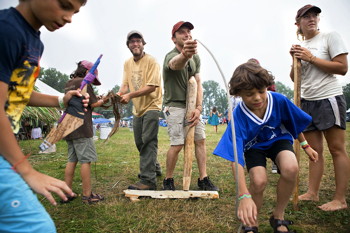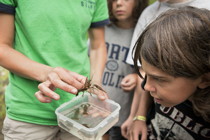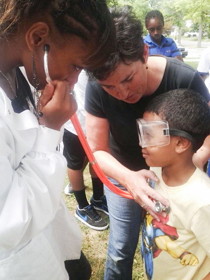COVER STORY
Action Teens, apples and the spirit of democracy: Cornell's culture of public engagement expands the definition of 'land grant'
Page 5 of 9

Staff members from Primitive Pursuits, an educational program of the Cornell Cooperative Extension in Tompkins County, at GrassRoots Festival of Music and Dance in Trumansburg, N.Y., to teach children about nature. See larger image
A 'partnership with the people'
Cornell Cooperative Extension (CCE) has a presence in every county of New York and makes direct contact (through counseling, classes and other programming) with 1.8 million people a year.
Helene Dillard, director of CCE, oversees 1,700 CCE employees around the state. "We work in partnership with the people – it's a multilane, multidirectional educational highway," she says.
From upstate to downstate, including all five boroughs of New York City, CCE deploys agricultural, nutrition, health, family, youth development and urban environment programs. In the Big Apple, for example, CUCE-NYC works with Cornell faculty and the Henry Street Settlement to improve college-readiness of low-income students through an innovative partnership.Other CUCE-NYC programs help high school students farm tilapia fish in their school's basement, develop science curricula around urban agriculture and provide free courses on basic research for adults.

Primitive Pursuits summer program at 4-H. See larger image
A recent example of CCE's responsiveness: Within hours of Hurricane Sandy this fall, it made resources available to victims of the storm. Its New York Extension Disaster Education Network (NY EDEN), eden.cce.cornell.edu, provided farmers, businesses and communities affected by the hurricane with education on hazardous materials, food safety, diseases and best-practice guides on dealing with long-term power outages and agricultural strategies for recovery for growers. NY EDEN also placed extension educators on disaster management and recovery teams.
Kids teaching kids

Citizen U Teen Leader Mariah Crandell with Sue Siebol-Simpson, from the Binghamton University School of Nursing, at a Cornell Cooperative Extension Super Science Fun Camp. Photo: June Mead. See larger image
Like Stoltzfus, Wendy Wolfe, a research associate in the College of Human Ecology's Division of Nutritional Sciences, devotes her work to helping people – in particular, U.S. children – to eat healthier foods.
In October, Wolfe won the statewide 4-H Award for Merit for creating two programs: Cornell 4-H Choose Health Action Teens (CHAT) and Choose Health: Food, Fun and Fitness (CHFFF).
The research that informs CHAT shows that teens learn by teaching, and that when teens become spokespeople for good nutrition, they practice what they preach. An additional benefit is that younger children, who are usually taught by adults, seem to love learning from and engaging with teens.
When she began searching for a good nutrition curriculum for her teens to use, however, Wolfe found that nothing fit the bill, and so she created one herself, with the help of a consultant, dozens of CCE nutrition and 4-H associates and teens giving feedback to fine-tune the course.
The end result, CHFFF, is a fun-packed, game-filled set of lesson plans and materials that has taken New York nutrition educators by storm. Favorites include the lesson demonstrating exactly how much sugar is in a bottle of cola, or the lesson showing how much fat is in the average fast-food burger. "Ewww" is the typical response, says Wolfe, "and they often vow never to drink soda again."
<<View entire story as one page>>
